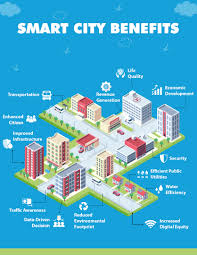
As technology continues to shape the way we live, the concept of smart cities is becoming more popular across the world. These urban spaces use advanced technology, data, and connectivity to make life better for residents. But beyond the convenience, there’s a big question many people are asking: How do smart cities affect property values?
Let’s explore how the growth of smart cities can impact real estate prices and what homeowners, investors, and renters need to know.

A smart city uses digital technology to improve public services, transportation, energy use, waste management, and safety. It relies on Internet of Things (IoT) devices, sensors, AI systems, and fast internet to collect data and manage city resources more efficiently.
Examples of smart city features include:
Cities like Singapore, Barcelona, Amsterdam, and Dubai are already leading the way in becoming fully integrated smart cities. In the U.S., cities such as New York, San Francisco, and Austin are implementing smart solutions.

Governments and developers are investing in smart cities because they offer many benefits:
These improvements attract both residents and businesses, which in turn, increases demand for housing.

Here’s how the rise of smart cities can directly impact property prices:
Smart cities make urban life more comfortable and sustainable. As a result, more people want to live in these areas, which raises demand for homes. High demand usually leads to higher property values, especially in well-connected, tech-enabled neighborhoods.
Smart cities often upgrade roads, utilities, and digital infrastructure. These improvements increase the overall attractiveness of an area. Buyers and renters are more willing to pay a premium for homes in areas with high-speed internet, smart public transport, and energy-efficient buildings.
For real estate investors, smart cities offer long-term gains. Investing in properties located in smart city zones may bring better returns as these areas grow and modernize.
Smart cities use data to make the housing market more transparent. Real-time insights into pricing, demand, and neighborhood trends help buyers and sellers make smarter decisions. This could lead to more stable pricing over time.
While smart cities offer many benefits, there are also challenges that can impact property values:
If you’re thinking about buying property in a smart city or one that’s transforming into one, here are some tips:
Smart cities are not just a trend — they are the future of urban living. With better services, smarter infrastructure, and stronger economic growth, they offer great potential for rising property values. However, it’s important to do your homework, understand the risks, and make informed decisions before investing in these high-tech urban areas.
Whether you are a homeowner, investor, or renter, keeping an eye on the rise of smart cities can help you stay ahead in the evolving real estate market.
Read More:- Shobha Realty Launches Its Most Luxurious Project Yet—Full Details Inside 2025
